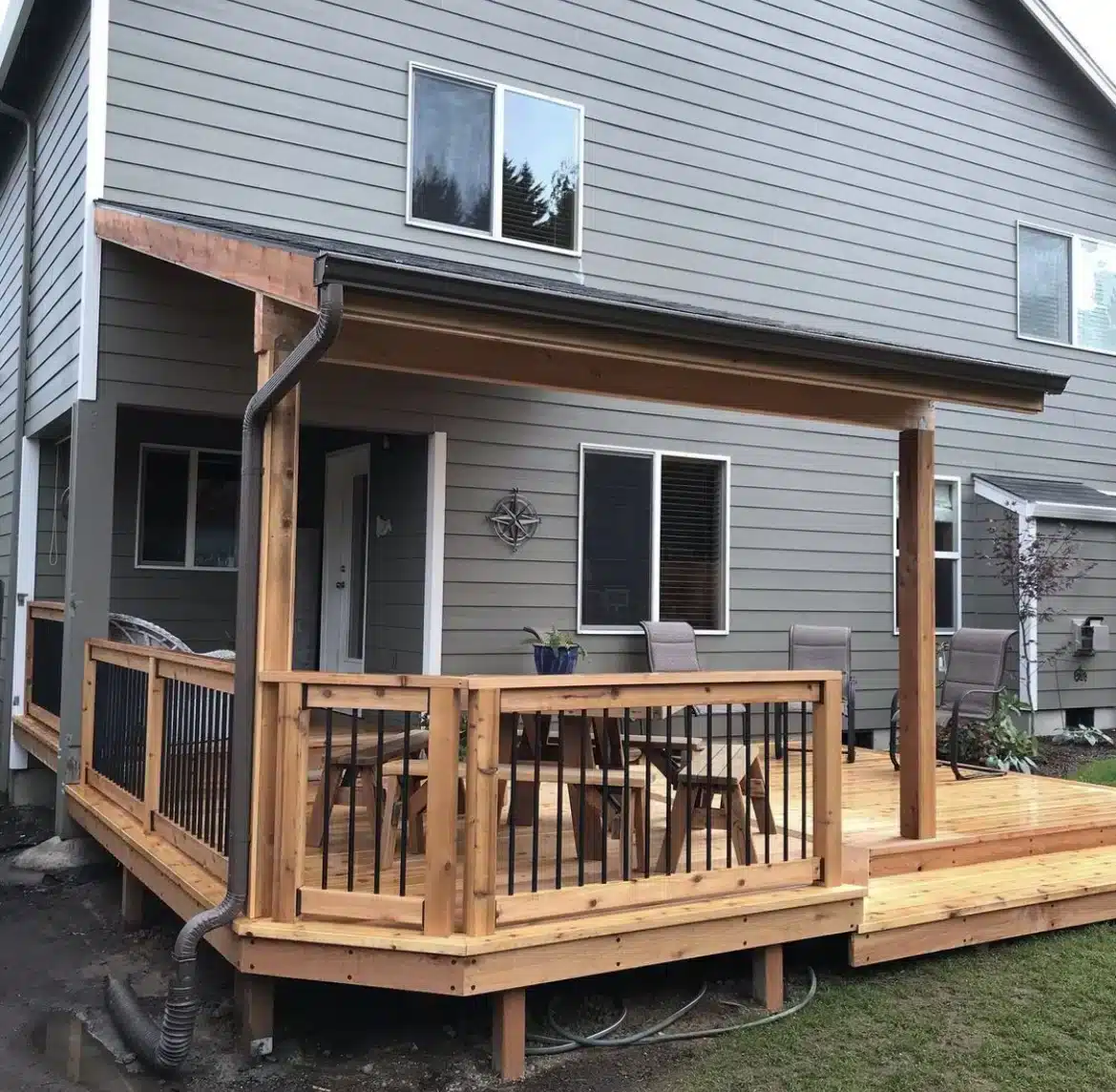Wood decks have captivated homeowners for centuries, cherished for their natural aesthetic that effortlessly harmonizes with any outdoor environment. Choosing a wood deck means embracing a classic look that never goes out of style, but it’s important to balance that timeless appeal with practical considerations of maintenance and durability.
Here, we explore wood’s enduring charm and intrinsic characteristics, helping you make a well-informed decision about this beautiful, classic choice for your outdoor living space.

The Timeless Appeal and Practical Considerations of Wood Decks
Wood decks offer a warm, natural aesthetic that can enhance any outdoor living space. Their distinctive grain patterns and colors bring timeless charm and a unique character. However, while wood’s natural beauty and versatility are highly prized, it also requires regular maintenance to combat moisture and insect damage.
Strengths of Wood Decks
- Natural Beauty: Wood decks bring an undeniable warmth and inviting ambiance to any outdoor space. With their rustic charm, wood decks’ unique grain patterns and natural color variations offer a distinct, irreplaceable aesthetic that synthetic materials cannot match.
- Versatility: Wood’s natural versatility makes it an excellent choice for customization. Whether you prefer a natural finish, a stained appearance, or a painted surface, wood can be easily modified to match your style and seamlessly integrate with your home’s overall architecture.
- Environmental Sustainability: Opting for wood decking can also be a nod to environmental responsibility. Wood is a renewable resource that contributes to more sustainable outdoor living solutions when sourced from sustainably managed forests. This makes wood decks a conscientious choice for those looking to minimize their environmental impact while enjoying their outdoor areas.
Weaknesses of Wood Decks
- Maintenance Requirements: Maintaining a wood deck demands consistent effort. Regular cleaning, sealing, and staining are essential to shield the wood from the elements and prevent rot, warping, and discoloration. Neglecting these maintenance tasks can lead to rapid deterioration, necessitating costly repairs or complete replacements.
- Susceptibility to Moisture and Insect Damage: Wood’s natural composition makes it prone to damage from moisture and insects, especially in humid climates or regions prone to termite activity. Proper treatment and ongoing preventative measures are crucial to preserve the integrity and longevity of a wood deck.
- Limited Lifespan: Despite diligent maintenance, wood decks generally have a shorter lifespan compared to their composite or synthetic counterparts. The lifespan of a wood deck can vary widely, typically requiring replacement every 10 to 20 years, depending on environmental conditions and the level of care provided. This limited longevity can be a significant consideration when comparing decking options.
Popular Wood Choices for Decks
Wooden decks provide a range of aesthetic and functional benefits, with each type offering unique qualities to enhance your outdoor space. From the cost-effective durability of pressure-treated pine to the upscale appeal of redwood and Ipe, choosing the right wood can define the longevity and style of your deck.
- Pressure-Treated Lumber: Pressure-treated wood, an economical option, is widely favored for its durability and accessibility. Treated with chemicals to fend off rot, insects, and moisture, pressure-treated pine stands up well to outdoor elements. However, the chemicals used can concern those seeking more natural, chemical-free building materials.
- Cedar: Known for its striking, warm, reddish hues and soothing natural aroma, cedar is not only beautiful but also naturally resistant to weathering and pests. This low-maintenance wood is ideal for those seeking a vibrant yet traditional deck aesthetic without frequent upkeep. Despite these advantages, cedar’s softer nature makes it more susceptible to scratches and dents than harder woods.
- Redwood: Due to its dense, rich fibers, redwood offers exceptional longevity and resistance to rot and pests as a high-end option. Although it comes with a higher price tag, its durability and classic beauty justify the investment for many. However, the availability and cost of redwood can be limiting factors, as it is less sustainable and harder to source in some regions.
Ipe: This hardwood is a luxurious choice known for its incredible toughness and aesthetic appeal. This dense hardwood resists moisture, scratches, and decay so effectively that it can last up to 40 years if properly maintained, making it ideal for a deck that endures through the seasons with minimal care. However, Ipe’s density makes it challenging to work with, requiring specialized tools and techniques, which can increase installation costs.
Comparing Wood and Composite Decking: Trends and Shifts in Material Choice
As homeowners seek long-lasting, low-maintenance solutions for their outdoor spaces, the debate between real wood and composite decking becomes increasingly relevant. Historically, wood has been the go-to choice for deck materials, prized for its natural beauty and traditional appeal.
However, recent trends indicate a significant shift toward building custom decks using composite decking, driven by its durability and evolving affordability.
- Wood Decking: Wood decks, such as those made from cedar, redwood, or pressure-treated pine, offer a classic look that many find irreplaceable. The natural grains and colors can enhance any backyard or garden setting. However, wood requires regular maintenance, including staining, sealing, and repair, which adds to the lifetime cost of the deck. Additionally, even with diligent care, most wood decks have a lifespan of 10 to 20 years before requiring major repairs or replacement.
- Composite Decking: Composite materials, a blend of wood fibers and recycled plastics, have emerged as a strong contender in decking. Not only do they mimic the look and feel of natural wood, but they also offer significant advantages in durability and maintenance. Composite deck boards require little more than basic cleaning and do not suffer from the common ailments of wood decks, such as splintering, warping, or fading. Furthermore, the lifespan of composite decks can be 25 to 50 years, outpacing traditional wood constructions.
- Cost Considerations and Market Trends: Initially, composite decking was far more expensive than wood, but as manufacturing processes have improved and the cost of timber has increased, the price gap between wood and composite materials has narrowed. This price convergence, combined with the long-term savings in maintenance and replacement, makes composite decking materials an increasingly popular choice among homeowners looking to maximize their investment and minimize upkeep.
- Durability and Longevity: The shift toward composite decking is also influenced by its superior durability and longevity. Homeowners opt for materials that will last longer and withstand harsh weather without constant upkeep. With composite decks promising a lifespan of up to 50 years, the appeal is clear.
Get a Consultation With Proper Built Today
Ready to transform your outdoor space with a beautiful wood deck? Contact Proper Built today to schedule a consultation and start designing the deck of your dreams. Let us help you create a perfect outdoor setting that you and your family will enjoy for years.




